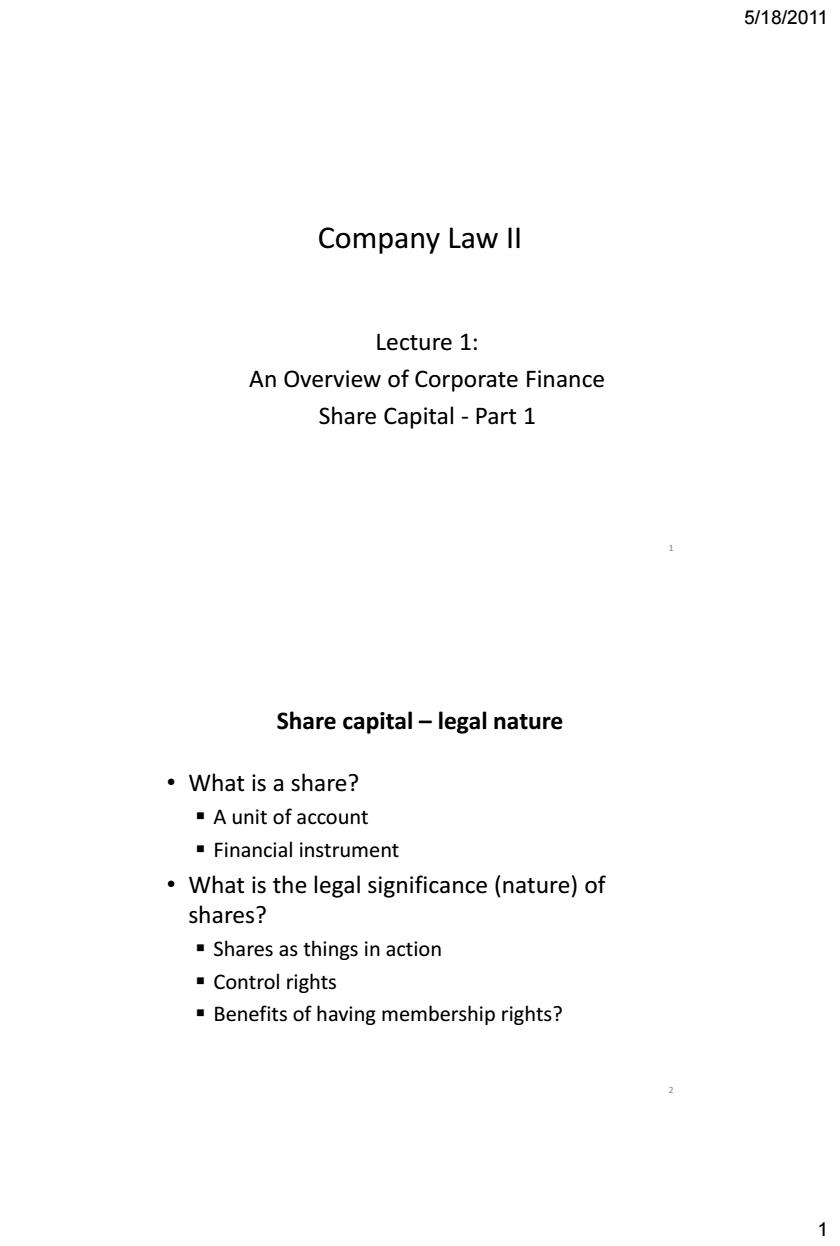
5/18/2011 Company Law ll Lecture 1: An Overview of Corporate Finance Share Capital-Part 1 Share capital-legal nature ·What is a share? ·A unit of account Financial instrument What is the legal significance(nature)of shares? Shares as things in action Control rights Benefits of having membership rights? 2 1
5/18/2011 1 1 Company Law II Lecture 1: An Overview of Corporate Finance Share Capital - Part 1 2 Share capital – legal nature • What is a share? A unit of account Financial instrument • What is the legal significance (nature) of shares? Shares as things in action Control rights Benefits of having membership rights?

5/18/2011 Share capital-terminologies ·Par(nominal)value ·Share of“no par value" ·Share premium ·Share capital Share capital-terminologies ·Types of shares: Ordinary (or equity,voting vs.non-voting) Preference(or preferred,participating,cumulative) ·Class Convertible preference (or preferred) Redeemable ·Deferred ■Bearer ·Bonus ·Fully paid ·Partly paid ■Forfeited 2
5/18/2011 2 3 Share capital - terminologies • Par (nominal) value • Share of “no par value” • Share premium • Share capital 4 Share capital - terminologies • Types of shares: Ordinary (or equity, voting vs. non-voting) Preference (or preferred, participating, cumulative) Class Convertible preference (or preferred) Redeemable Deferred Bearer Bonus Fully paid Partly paid Forfeited
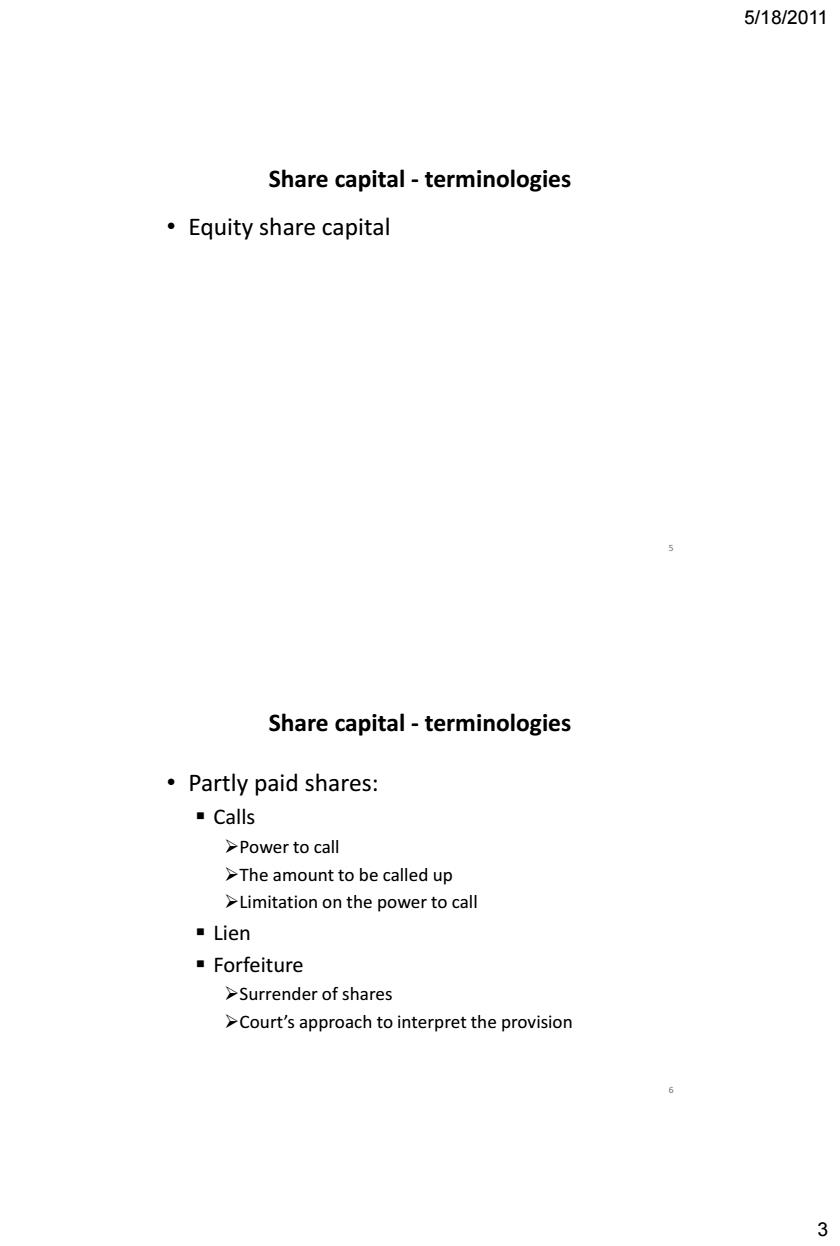
5/18/2011 Share capital-terminologies ·Equity share capital Share capital-terminologies ·Partly paid shares: ·Calls >Power to call >The amount to be called up >Limitation on the power to call ■Lien ■Forfeiture >Surrender of shares >Court's approach to interpret the provision 6 3
5/18/2011 3 5 Share capital - terminologies • Equity share capital 6 Share capital - terminologies • Partly paid shares: Calls Power to call The amount to be called up Limitation on the power to call Lien Forfeiture Surrender of shares Court’s approach to interpret the provision
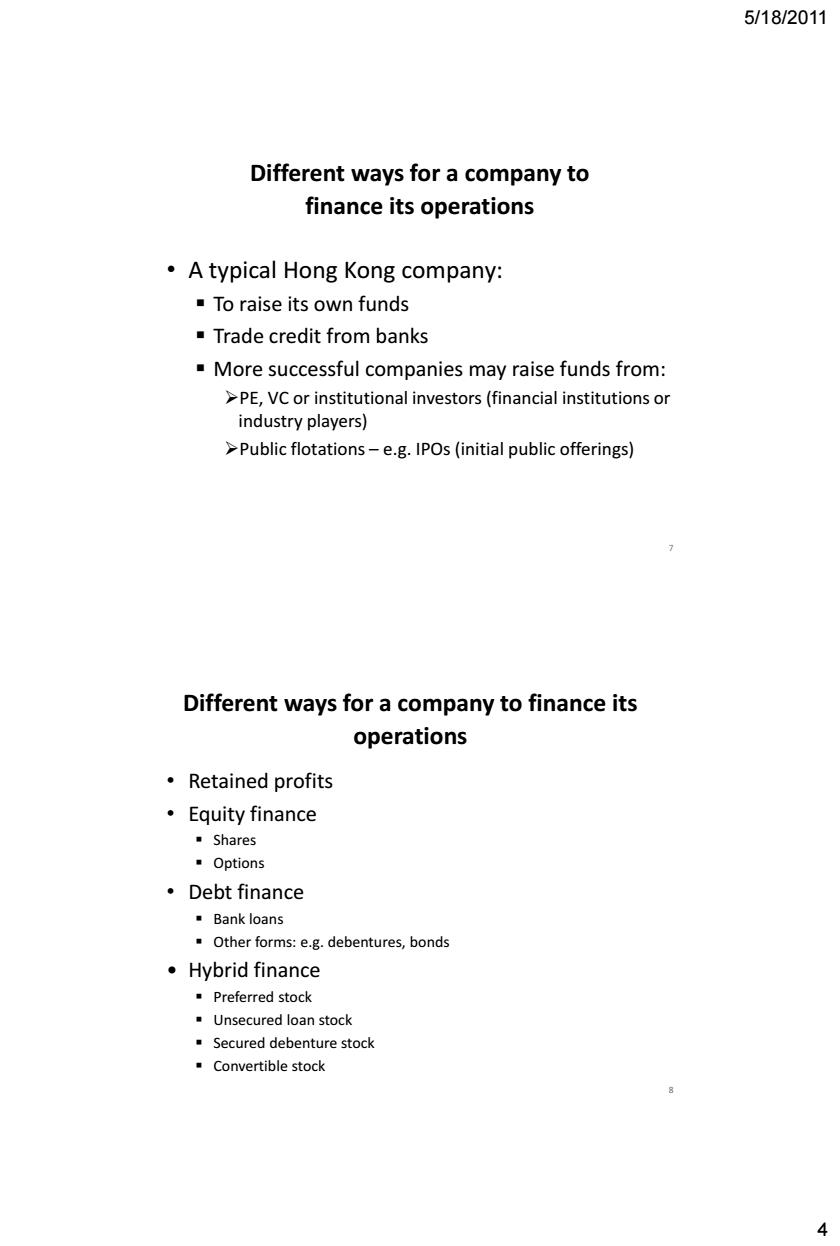
5/18/2011 Different ways for a company to finance its operations A typical Hong Kong company: To raise its own funds Trade credit from banks More successful companies may raise funds from: >PE,VC or institutional investors(financial institutions or industry players) >Public flotations-e.g.IPOs(initial public offerings) Different ways for a company to finance its operations ·Retained profits ·Equity finance Shares Options ·Debt finance 。Bank loans Other forms:e.g.debentures,bonds ·Hybrid finance Preferred stock Unsecured loan stock Secured debenture stock ·Convertible stock
5/18/2011 4 7 Different ways for a company to finance its operations • A typical Hong Kong company: To raise its own funds Trade credit from banks More successful companies may raise funds from: PE, VC or institutional investors (financial institutions or industry players) Public flotations – e.g. IPOs (initial public offerings) 8 Different ways for a company to finance its operations • Retained profits • Equity finance Shares Options • Debt finance Bank loans Other forms: e.g. debentures, bonds • Hybrid finance Preferred stock Unsecured loan stock Secured debenture stock Convertible stock
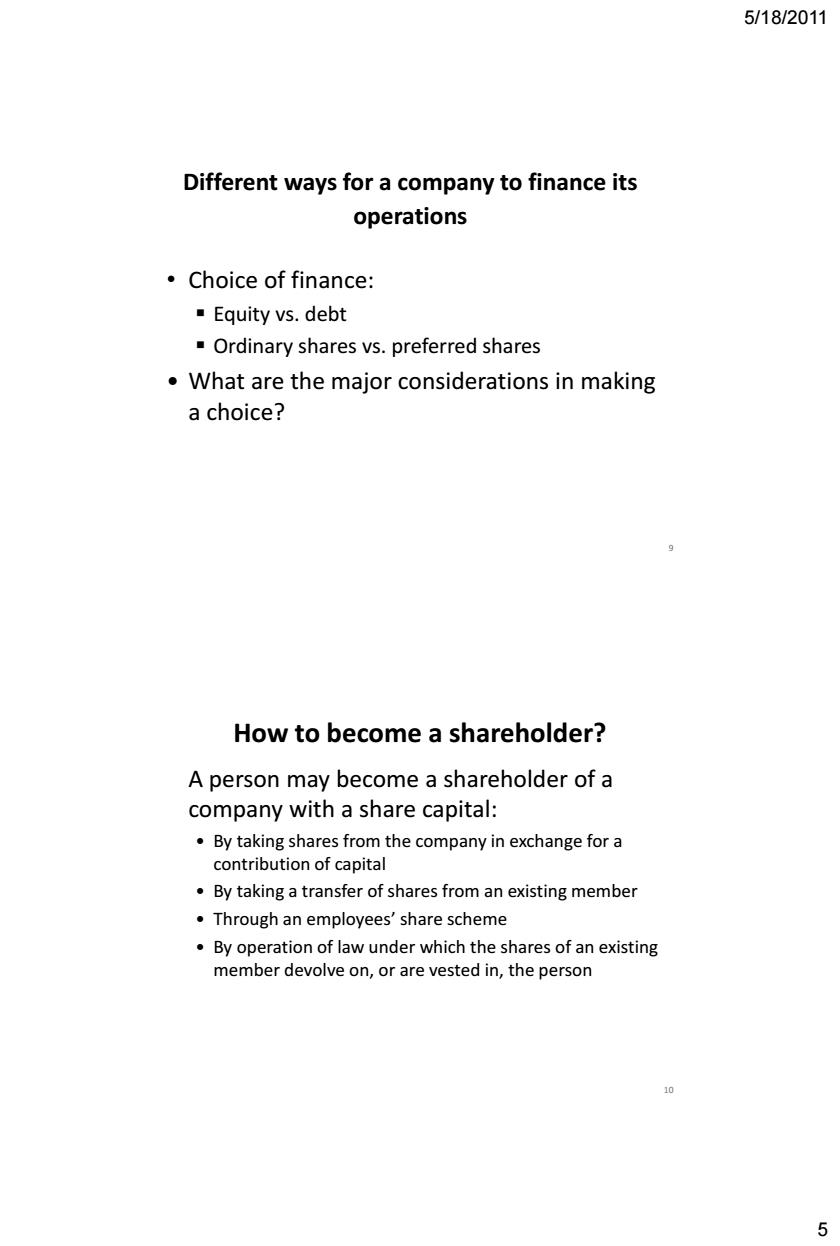
5/18/2011 Different ways for a company to finance its operations ·Choice of finance:: Equity vs.debt Ordinary shares vs.preferred shares What are the major considerations in making a choice? 9 How to become a shareholder? A person may become a shareholder of a company with a share capital: By taking shares from the company in exchange for a contribution of capital By taking a transfer of shares from an existing member Through an employees'share scheme By operation of law under which the shares of an existing member devolve on,or are vested in,the person 10 5
5/18/2011 5 9 Different ways for a company to finance its operations • Choice of finance: Equity vs. debt Ordinary shares vs. preferred shares • What are the major considerations in making a choice? 10 How to become a shareholder? A person may become a shareholder of a company with a share capital: • By taking shares from the company in exchange for a contribution of capital • By taking a transfer of shares from an existing member • Through an employees’ share scheme • By operation of law under which the shares of an existing member devolve on, or are vested in, the person
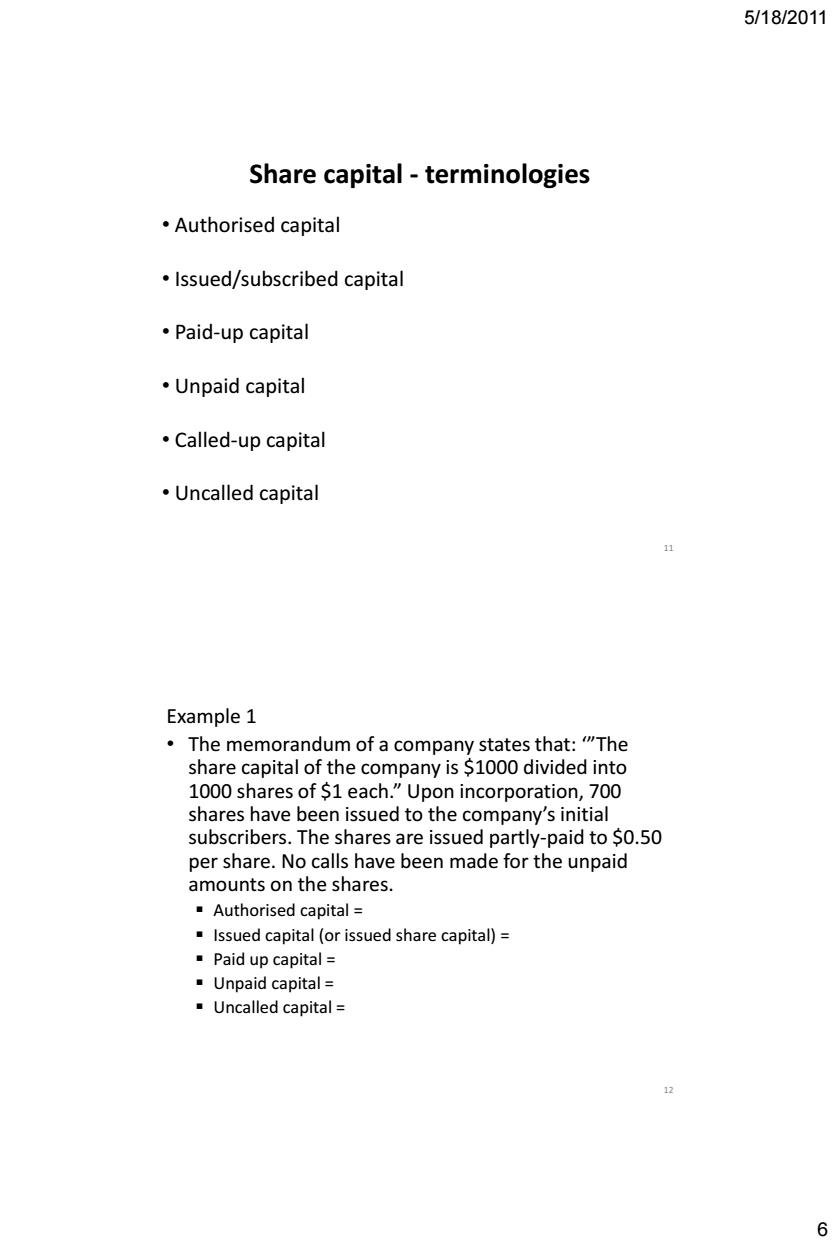
5/18/2011 Share capital-terminologies ·Authorised capital Issued/subscribed capital ·Paid-up capital Unpaid capital ·Called-up capital ·Uncalled capital 11 Example 1 The memorandum of a company states that:"The share capital of the company is $1000 divided into 1000 shares of $1 each."Upon incorporation,700 shares have been issued to the company's initial subscribers.The shares are issued partly-paid to $0.50 per share.No calls have been made for the unpaid amounts on the shares. Authorised capital Issued capital (or issued share capital)= Paid up capital= Unpaid capital Uncalled capital= 6
5/18/2011 6 11 • Authorised capital • Issued/subscribed capital • Paid-up capital • Unpaid capital • Called-up capital • Uncalled capital Share capital - terminologies 12 Example 1 • The memorandum of a company states that: ‘”The share capital of the company is $1000 divided into 1000 shares of $1 each.” Upon incorporation, 700 shares have been issued to the company’s initial subscribers. The shares are issued partly-paid to $0.50 per share. No calls have been made for the unpaid amounts on the shares. Authorised capital = Issued capital (or issued share capital) = Paid up capital = Unpaid capital = Uncalled capital =
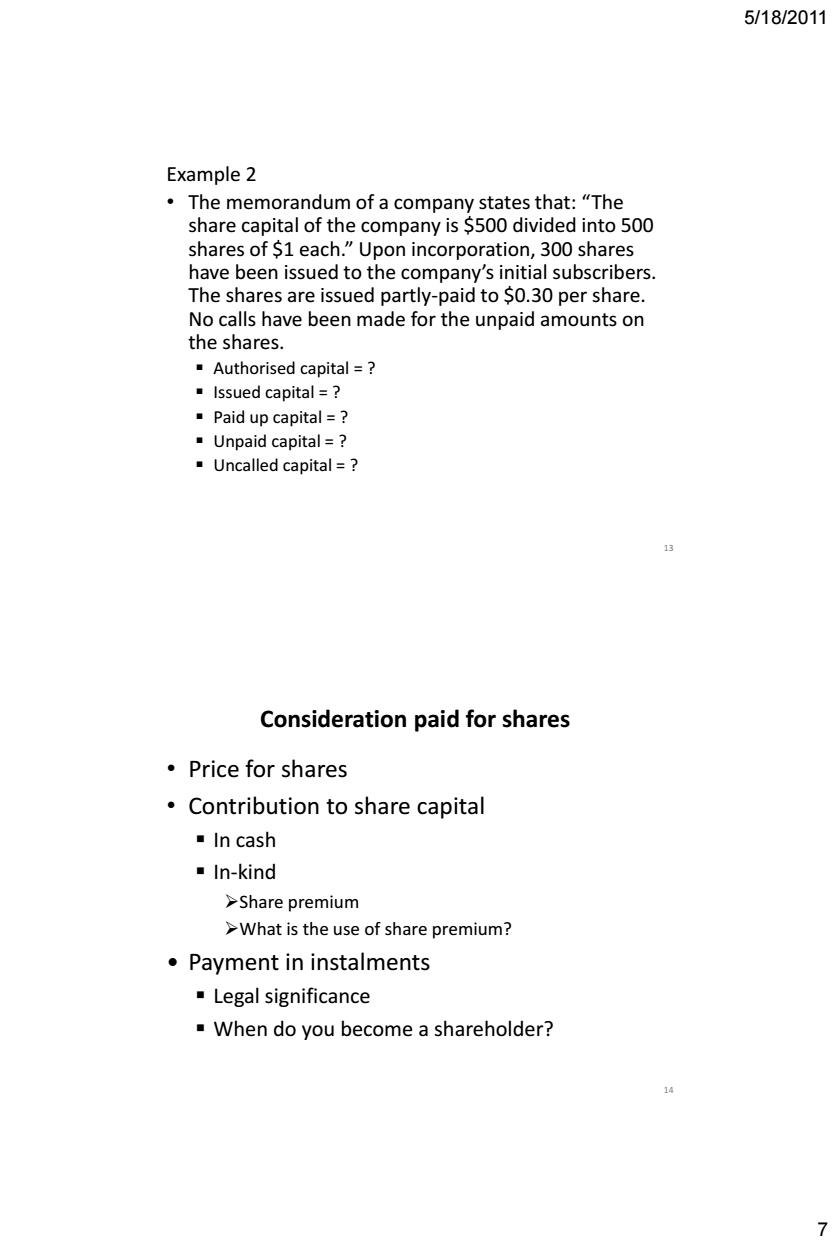
5/18/2011 Example 2 ·The memorandum of a company states that:“The share capital of the company is $500 divided into 500 shares of $1 each."Upon incorporation,300 shares have been issued to the company's initial subscribers The shares are issued partly-paid to $0.30 per share. No calls have been made for the unpaid amounts on the shares. Authorised capital = Issued capital = Paid up capital = 。Unpaid capital=? Uncalled capital = 13 Consideration paid for shares ·Price for shares Contribution to share capital In cash 。ln-kind >Share premium >What is the use of share premium? Payment in instalments Legal significance When do you become a shareholder? 14 7
5/18/2011 7 13 Example 2 • The memorandum of a company states that: “The share capital of the company is $500 divided into 500 shares of $1 each.” Upon incorporation, 300 shares have been issued to the company’s initial subscribers. The shares are issued partly-paid to $0.30 per share. No calls have been made for the unpaid amounts on the shares. Authorised capital = ? Issued capital = ? Paid up capital = ? Unpaid capital = ? Uncalled capital = ? 14 Consideration paid for shares • Price for shares • Contribution to share capital In cash In-kind Share premium What is the use of share premium? • Payment in instalments Legal significance When do you become a shareholder?
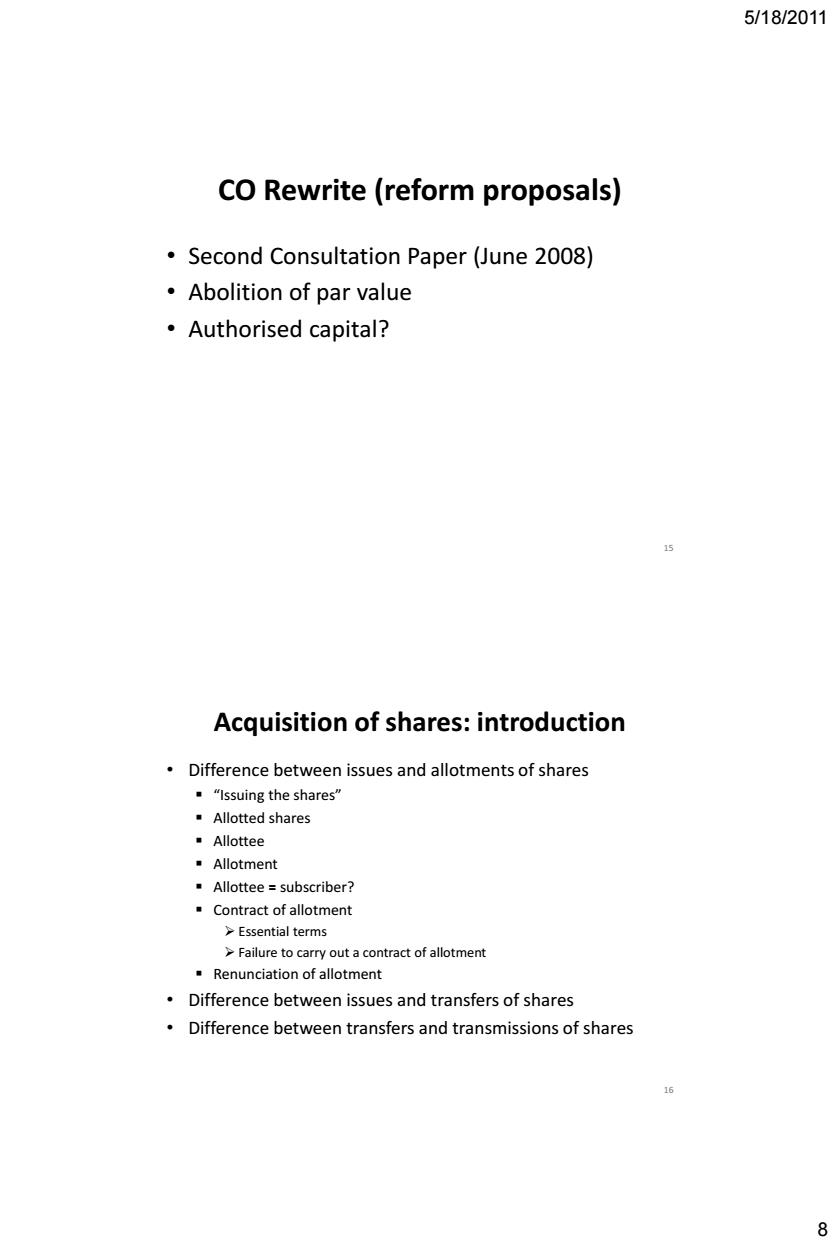
5/18/2011 CO Rewrite (reform proposals) Second Consultation Paper (June 2008) Abolition of par value ·Authorised capital? Acquisition of shares:introduction Difference between issues and allotments of shares ·"Issuing the shares'” Allotted shares Allottee "Allotment .Allottee =subscriber? Contract of allotment >Essential terms >Failure to carry out a contract of allotment Renunciation of allotment Difference between issues and transfers of shares Difference between transfers and transmissions of shares 16 8
5/18/2011 8 15 CO Rewrite (reform proposals) • Second Consultation Paper (June 2008) • Abolition of par value • Authorised capital? 16 Acquisition of shares: introduction • Difference between issues and allotments of shares “Issuing the shares” Allotted shares Allottee Allotment Allottee = subscriber? Contract of allotment Essential terms Failure to carry out a contract of allotment Renunciation of allotment • Difference between issues and transfers of shares • Difference between transfers and transmissions of shares

5/18/2011 Allotment and issues of shares How are shares issued? New companies Existing companies >Rights issues:pro-rata issues to existing s/ers >Private placements >Public offers The distribution of the corporate power to allot,issue and attach rights to shares 17 Hong Kong as an international financial centre Emergence as an international financial centre Establishment and growth of financial institutions Growth of stock market Features of an international financial centre Provision of financial intermediation services Why has HK become an international financial centre? ■Stable government Free market policies Efficient infrastructure Relatively effective regulatory framework Low and simple tax system 18 9
5/18/2011 9 17 Allotment and issues of shares • How are shares issued? New companies Existing companies Rights issues: pro-rata issues to existing s/ers Private placements Public offers • The distribution of the corporate power to allot, issue and attach rights to shares 18 Hong Kong as an international financial centre • Emergence as an international financial centre Establishment and growth of financial institutions Growth of stock market • Features of an international financial centre Provision of financial intermediation services • Why has HK become an international financial centre? Stable government Free market policies Efficient infrastructure Relatively effective regulatory framework Low and simple tax system
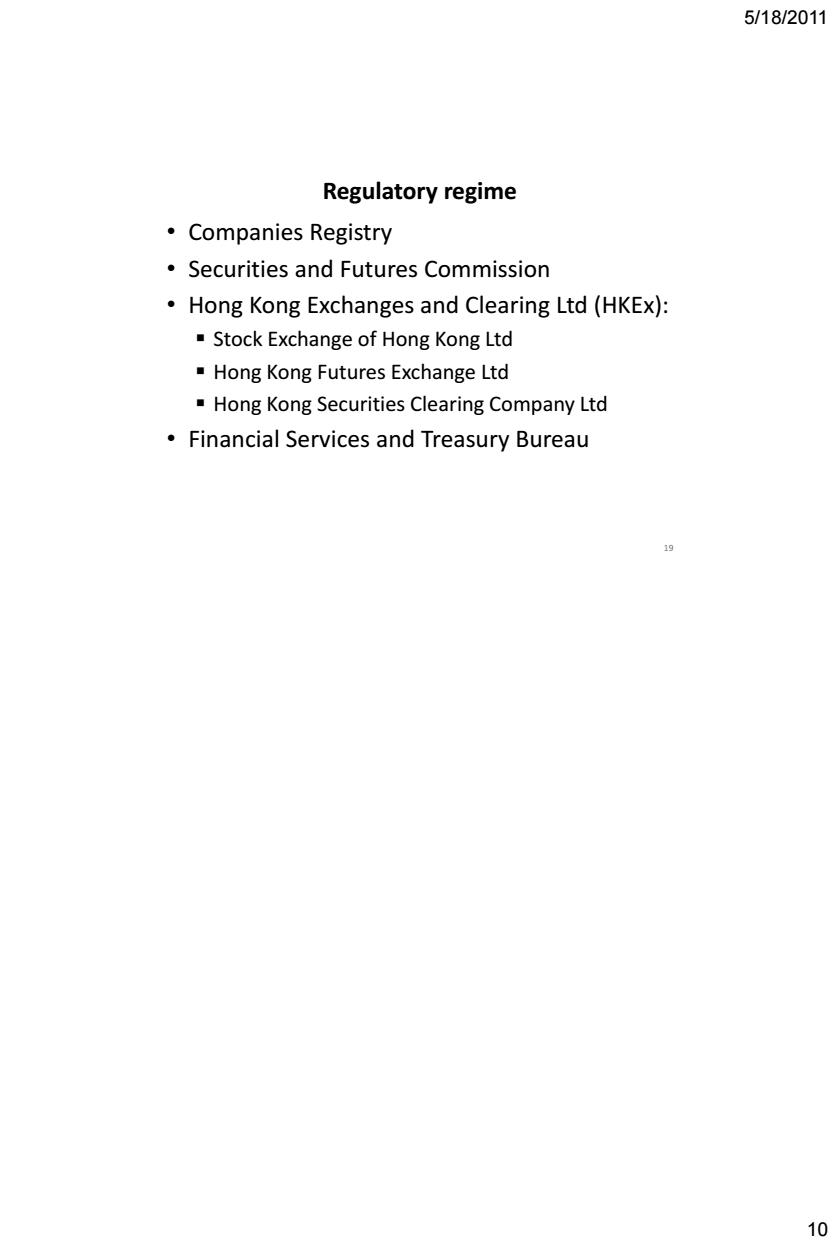
5/18/2011 Regulatory regime ·Companies Registry Securities and Futures Commission Hong Kong Exchanges and Clearing Ltd(HKEx): Stock Exchange of Hong Kong Ltd Hong Kong Futures Exchange Ltd Hong Kong Securities Clearing Company Ltd Financial Services and Treasury Bureau 19 10
5/18/2011 10 19 Regulatory regime • Companies Registry • Securities and Futures Commission • Hong Kong Exchanges and Clearing Ltd (HKEx): Stock Exchange of Hong Kong Ltd Hong Kong Futures Exchange Ltd Hong Kong Securities Clearing Company Ltd • Financial Services and Treasury Bureau